 Vertigo is a common symptom in Meniere’s disease. It is the sensation of dizziness or spinning. A person may feel as if the room they are in is moving when, in fact, it is not. Meniere’s disease is a condition that affects the middle ear and is most common in those aged 40 to 60 years.
Vertigo is a common symptom in Meniere’s disease. It is the sensation of dizziness or spinning. A person may feel as if the room they are in is moving when, in fact, it is not. Meniere’s disease is a condition that affects the middle ear and is most common in those aged 40 to 60 years.
Aside from vertigo, Meniere’s disease can also cause hearing loss, dulled hearing, tinnitus, ear pressure, and distortion of loud sounds.
Advertisement
Vertigo is a troublesome symptom of Meniere’s disease, as it can affect a person’s ability to walk or even stand. The individual may feel as if they are spinning or the room is spinning, which can make their daily life difficult. Vertigo attacks in Meniere’s disease can vary from mild to quite severe. In severe cases of vertigo, one’s risk of injury increases, too.
Along with feeling dizzy, a person may feel nauseous or even the urge to vomit. In severe cases, one may even lose control of their bowels or bladder. Other symptoms of Meniere’s disease may accompany the attack, causing further anxiety and stress.
The scary part is, a vertigo attack can occur at any time. You can be at a grocery store, in your car driving, or anywhere out in public. This can be a scary experience, especially if you are surrounded by those who are unfamiliar with your condition. If you experience an attack in public, it’s important that you reach out to a passerby and explain the situation.
Treatment and prevention of vertigo attacks in Meniere’s disease
Medications may aid in the relief of vertigo and reduce the risk of attacks. Drugs can also be used to minimize nausea and vomiting. Some patients may experience what is known as aura, which precedes an attack. If you experience aura prior to a vertigo flare, you should take your medication.
Advertisement
Treatments that may help prevent vertigo attacks include:
- Medications that increase blood flow to the ear to reduce fluid and prevent symptoms
- Other prescribed medications as directed by the doctor – these may include diuretics or beta-blockers
- Gentamicin injections, which are done through the ear drum to put a high concentration of the drug directly into the ear
- Pressure pulse treatment, which is a device that generates a pulse through pressurized air
- Surgery of the inner ear
Diet and lifestyle habits may aid with vertigo in Meniere’s disease, too. For starters, you may wish to embark on a low-salt diet, take part in regular exercise, stop smoking, and uncover any food triggers that may provoke an attack. Although these methods aren’t proven, they have been shown to offer vertigo relief and management in some patients with Meniere’s disease.
By following your doctor’s orders, you can have greater success in managing your vertigo and Meniere’s disease.
